by Alec Luhn in Debaltseve
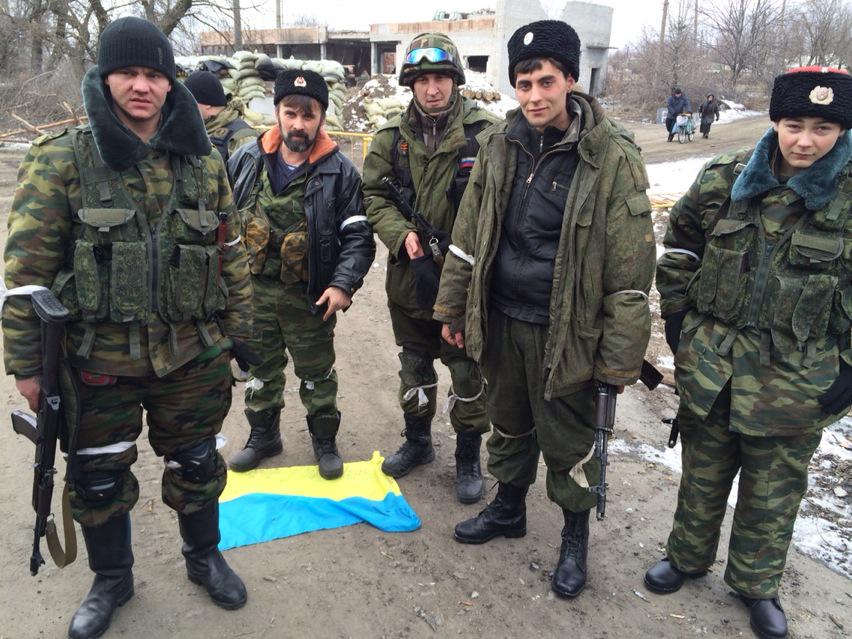
Russian Cossack soldiers and Ukrainian flag - Debaltseve, Feb. 20.
EU leader warns of ‘further action’ if diplomacy fails as rebels’ leadership vacuum imperils peace efforts
As the sun set over the cratered fields around Debaltseve, a group of pro-Russia Cossack fighters were retrieving boxes of anti-tank artillery rounds and two armoured vehicles left by Kiev’s forces on the side of the Rostov-Kharkiv highway, which was littered with mangled cars and turret-less tanks.
Shattered petrol stations and garages attested to weeks of intense fighting for the strategic town. Two troop transport trucks that had crashed into each other, scattering boots and clothing, spoke of the Ukrainian forces’ rushed, chaotic retreat this week.
“Donetsk and Luhansk regions are our home. We will take back our land,” said Andrei Dyomin as he tethered one broken-down fighting vehicle to a truck. “Every ceasefire they move up their armour and start killing us again. There won’t be a ceasefire, there will be war.”
As if to illustrate his words, barrages of artillery and rocket fire boomed across the fields from the direction of the frontline as he spoke. The capture of the key rail junction town of Debaltseve, where Ukrainian troops had been surrounded and almost entirely cut off from their main lines, satisfied Russian president Vladimir Putin and rebel leaders’ main grievance with the peace plan agreed in Minsk last week. But though fighting has quieted, violations of Sunday’s ceasefire continue.
Shattered petrol stations and garages attested to weeks of intense fighting for the strategic town. Two troop transport trucks that had crashed into each other, scattering boots and clothing, spoke of the Ukrainian forces’ rushed, chaotic retreat this week.
“Donetsk and Luhansk regions are our home. We will take back our land,” said Andrei Dyomin as he tethered one broken-down fighting vehicle to a truck. “Every ceasefire they move up their armour and start killing us again. There won’t be a ceasefire, there will be war.”
As if to illustrate his words, barrages of artillery and rocket fire boomed across the fields from the direction of the frontline as he spoke. The capture of the key rail junction town of Debaltseve, where Ukrainian troops had been surrounded and almost entirely cut off from their main lines, satisfied Russian president Vladimir Putin and rebel leaders’ main grievance with the peace plan agreed in Minsk last week. But though fighting has quieted, violations of Sunday’s ceasefire continue.
Many pro-Russia fighters in Debaltseve said they didn’t believe the truce could last and vowed to fight further to take back government-controlled areas of Donetsk and Luhansk regions. Concerns are rising that the separatists may still be aiming to take Mariupol, a government-held city on the Sea of Azov.
On Friday, pro-Russia rebels were celebrating their victory in front of the windowless town hall as relieved locals emerged from the basements and bomb shelters were they have spent much of the last month. A truck from Donetsk delivered medicine and food to a vacant store. Fighters and residents lined up to kiss a 200-year-old icon called the Tikhvinskaya rebel, which could make fighters invisible and cause enemies to kill each other, according to the Russian Orthodox activists who had brought it from Moscow. “We wanted to set up this icon to become a symbol for the ceasefire,” a Russian activist named Alexander Titov said.
In a positive sign for the peace plan agreed in Minsk last week, the Guardian saw at least a dozen multiple rocket launch systems driving further into rebel territory from the area near Debaltseve and Perevalsk, as well as numerous trucks carrying ammunition – both sides were supposed to begin pulling back heavy weapons on Tuesday to create a buffer zone of up to 140km (87 miles). Although Donetsk and Luhansk leaders said they had begun pulling back weapons, ceasefire monitors from the Organisation for Security and Cooperation in Europe said on Thursday they had not yet seen evidence of a full withdrawal.
Ukrainian army command said it had drafted a plan of action according to which “weapons will be simultaneously withdrawn by both sides”. But occasional distant shelling could be heard all afternoon in Debaltseve, including at least one volley from a multiple rocket launcher.
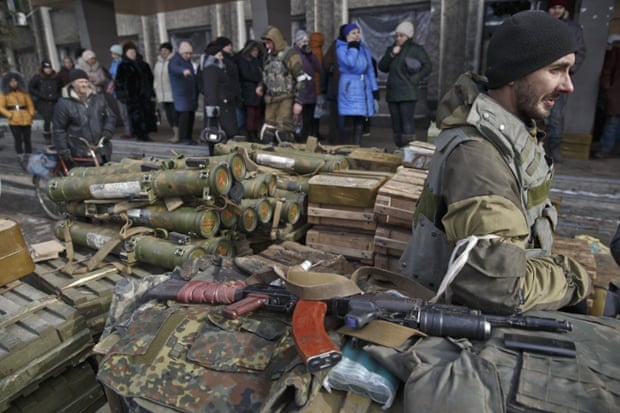
Residents line up waiting for a delivery of aid as a Russia-backed rebel guards a pile of weapons and ammunition outside an administration building.
Meanwhile, Donald Tusk, the European council president, said EU leaders were considering new sanctions to pressure separatists in eastern Ukraine to stick to the ceasefire agreement. He said there had been “more than 300 violations” of the truce since last weekend, when it was supposed to begin, and warned that the EU is “reaching a point when further diplomatic efforts will be fruitless unless credibly backed up by further action”.
About 5,000 of 25,000 residents have remained in Debaltseve, according to Alexander “Greek” Afendikov, commander of the Orthodox army fighting unit who was appointed mayor of Debaltseve on Thursday by Alexander Zakharchenko, the head of the Donetsk People’s Republic. He claimed 80% of Debaltseve’s residential housing had been ruined in the fighting.
While that figure may be exaggerated, the destruction was wide-reaching. Shell impacts had blown huge gaps in the sides of apartment buildings and caved-in one-storey homes, concrete walls were full of bullet and shrapnel holes, and unexploded mortar and artillery rounds protruded from the road in several places. A tyre marked “mine” near the railway station reminded of the Cossack who was killed when his car hit a mine on Thursday. The head of a Soviet hero of labour statue had been partially blown off.
But besides downed electric lines and a damaged station, the town’s railway lines, which connect the capitals of the Donetsk and Luhansk separatist republics, appeared to be mostly intact. Zakharchenko has promised they will be used to transport coal, the region’s traditional export.
About 5,000 of 25,000 residents have remained in Debaltseve, according to Alexander “Greek” Afendikov, commander of the Orthodox army fighting unit who was appointed mayor of Debaltseve on Thursday by Alexander Zakharchenko, the head of the Donetsk People’s Republic. He claimed 80% of Debaltseve’s residential housing had been ruined in the fighting.
While that figure may be exaggerated, the destruction was wide-reaching. Shell impacts had blown huge gaps in the sides of apartment buildings and caved-in one-storey homes, concrete walls were full of bullet and shrapnel holes, and unexploded mortar and artillery rounds protruded from the road in several places. A tyre marked “mine” near the railway station reminded of the Cossack who was killed when his car hit a mine on Thursday. The head of a Soviet hero of labour statue had been partially blown off.
But besides downed electric lines and a damaged station, the town’s railway lines, which connect the capitals of the Donetsk and Luhansk separatist republics, appeared to be mostly intact. Zakharchenko has promised they will be used to transport coal, the region’s traditional export.
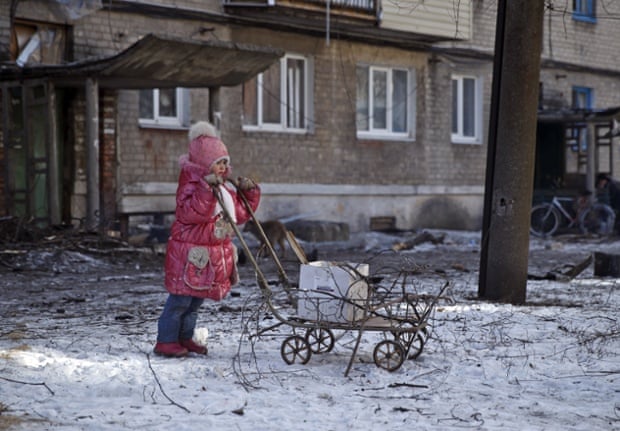
A girl leans on a cart used to carry tree branches for fire, outside a damaged apartment building.
Residents said there had been no electricity or water since heavy shelling began on 22 January, and homes were barely warmer than the frigid weather outside. Pensioner Lyudmila Shirina said her and her daughter’s one-storey houses on the outskirts had been destroyed by shelling on 9 February, after which she had started living in a bomb shelter beneath a small apartment block. A shell hit the roof of that building on Wednesday, she said.
“Today is the first day it’s been quiet, but we don’t say that word, as soon as we even think it, [government forces] start shooting again,” Shirina said, adding that a wide variety of incendiary rockets had been hitting the town.
Although she said Ukrainian troops had dug in positions in the gardens of homes on the outskirts, she nonetheless blamed the destructive incoming fire on Kiev’s forces, claiming they often shelled their own men. “We’re sick of war, but we want [president Petro] Poroshenko and his kids to experience what we did,” she said.
Afendikov promised that “there will be complete peace here” in the future. Asked about the sound of occasional shelling in the distance, he said he didn’t know which side was shooting.
Pavel Grebnov, a doctor from the Russian city of Khabarovsk who is fighting with the rebels, argued that both sides were breaking the ceasefire but pro-Russian forces received most of the blame. “There are people who lost family members, who want revenge, they don’t want a ceasefire,” he said about isolated ceasefire violations from the rebel side.
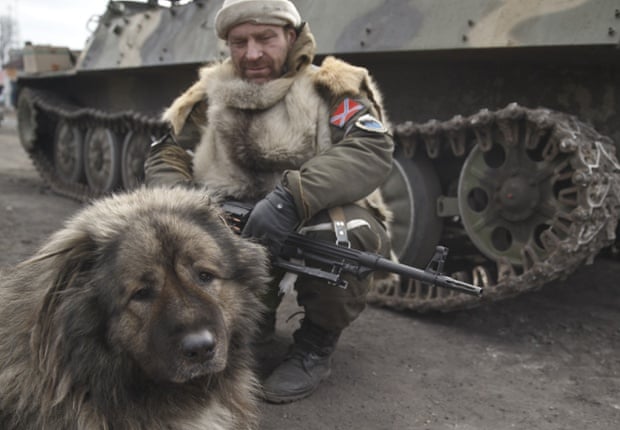
A dog sits next to a Russia-backed rebel near his tank. Photograph: Vadim Ghirda/AP
A grizzled fighter with a Kalashnikov and a chest full of medals, which he said were from tours as a lieutenant colonel in the Soviet army, vowed to fight on in the Kharkiv, Dnipropetrovsk and Zaporizhya regions, arguing that “the ceasefire doesn’t relate to us” because of violations by Kiev’s forces. The man, who would give his name only as Valera, admitted that “they’re not letting us go forward because of incorrect leadership”. But he promised that his commander, a Russian former colonel named Igor Bezler who was ousted in a power struggle this summer, would soon return and press the offensive. “I can’t promise we’ll go to Kiev, but we’ll get to Kharkiv 100%,” he said.
Perhaps the greatest threat to the ceasefire from the rebel side will be the at times chaotic chain of command. Although they’re based in territory nominally belonging to the Luhansk People’s Republic, the Cossacks with Dyomin said their allegiance was to Pavel Dryomov and Nikolai Kozytsin, two Cossack leaders who have sometimes clashed with the leadership of the people’s republic. The mayor of the frontline town of Popasna told the Guardian on Thursday he blamed out-of-control Cossack fighters for continuing to shell his city despite the ceasefire.
Both Kiev and the separatist republics have reserved the right to respond if fired upon, a command that can easily escalate into open warfare given the disparate groups on the rebel side and the many loosely regulated volunteer battalions among the government forces.
A female rebel fighter who would give only her first name, Anastasia, admitted that “many different orders” came down from the leadership. “When they shoot at us we need to respond, but we’re trying not to,” she said.

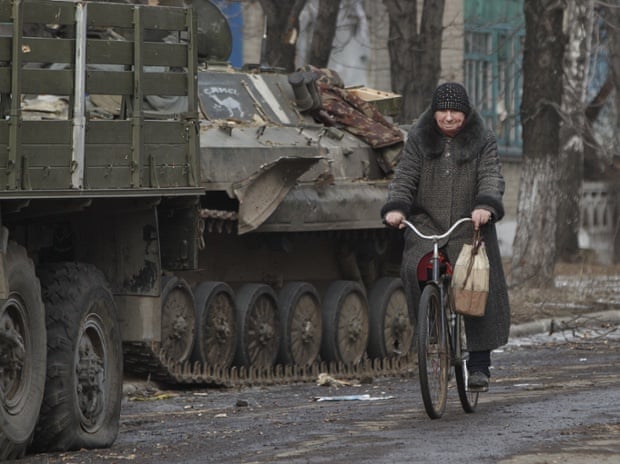
No comments:
Post a Comment